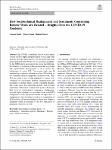Item Infomation
Full metadata record
| DC Field | Value | Language |
|---|---|---|
| dc.contributor.author | Vanessa, Kohn | - |
| dc.contributor.author | Muriel, Frank | - |
| dc.contributor.author | Roland, Holten | - |
| dc.date.accessioned | 2023-05-05T01:37:05Z | - |
| dc.date.available | 2023-05-05T01:37:05Z | - |
| dc.date.issued | 2023 | - |
| dc.identifier.uri | https://link.springer.com/article/10.1007/s12599-023-00798-8 | - |
| dc.identifier.uri | https://dlib.phenikaa-uni.edu.vn/handle/PNK/8400 | - |
| dc.description | CC BY | vi |
| dc.description.abstract | The COVID-19 pandemic forced sociotechnical systems (STS) to highly integrate remote work. Large-scale analyses show that the positivity of tweets about work from home decreased until COVID-19 was declared a pandemic by the WHO and re-increased in the weeks that followed. Nevertheless, it is unclear if this reaction is due to personal and organizational developments or if it mirrors the realignment of entire STS. The present study uses Q methodology to identify differences in how STS realign to the externally enforced integration of remote work. Only STS that reach a state of high alignment to remote work conditions by successfully shifting communication and procedures to digital spheres can be considered resilient. The results show that employees describe their personal experiences with remote work as more positive the higher their level of sociotechnical realignment. | vi |
| dc.language.iso | en | vi |
| dc.publisher | Springer | vi |
| dc.subject | STS | vi |
| dc.subject | Sociotechnical Realignment | vi |
| dc.title | How Sociotechnical Realignment and Sentiments Concerning Remote Work are Related – Insights from the COVID-19 Pandemic | vi |
| dc.type | Book | vi |
| Appears in Collections | ||
| OER - Kinh tế và Quản lý | ||
Files in This Item:

